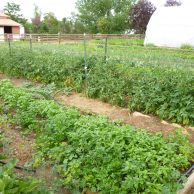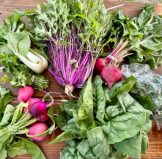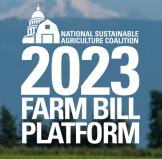 Every 5 years or so Congress has the opportunity to transform our food system by revising a piece of legislation known as the Farm Bill, which covers everything from supporting farmers to ensuring food security for all. Politicians and local and national advocacy organizations are working to determine how nearly a billion dollars a year will be spent. You can help!
Every 5 years or so Congress has the opportunity to transform our food system by revising a piece of legislation known as the Farm Bill, which covers everything from supporting farmers to ensuring food security for all. Politicians and local and national advocacy organizations are working to determine how nearly a billion dollars a year will be spent. You can help!
This is a great opportunity to help create a more just and ecologically sound food and farming system!
The farm bill connects the food on our plates, the farmers and ranchers who produce that food, and the natural resources – our soil, air and water – that make growing food possible. Covering programs ranging from crop insurance for farmers to healthy food access for low-income families, from beginning farmer training to support for sustainable farming practices, the farm bill determines our food and farm systems. As
advocates for family farmers and sustainable agriculture, it’s up to each of us to make sure that this important bill is good for farmers, consumers, and for the natural environment.
What’s on the table this year? Many sustainable and equitable changes are being introduced, including:
– Food as Medicine –funding for doctors to issue prescriptions for fresh, local, nutrient-dense produce, especially for food-insecure people, as benefits of federal programs like Medicare, Medicaid, and the Veterans Administration. You may have heard of ‘food deserts,’ a term that makes the lack of available stores in an area seem like a natural part of the landscape instead of an injustice created by policy. Hunger-relief advocates refer to these locations as areas of ‘food apartheid’’ instead. The proposed changes
to the Farm Bill would address this systemic inequity.

Veggies!
– Increased support for regenerative agricultural practices that protect the environment
– Support for BIPOC farmers (Black, Indigenous People of Color)
– Increased support for SNAP and other food access programs
– Modifications making it easier for farmers to obtain organic certification
– Modifications to farm subsidies, for example reducing subsidies that incentivize animal feed production and increasing subsidies for farmers to grow fruit and vegetables for people.
Who’s Working on this, and How You Can Participate:
National politicians and local and national organizations are working on this year’s Farm Bill. Like Senator Cory Booker, who went to Washington, DC earlier in early February to lobby, and to present at the Food Not Feed Summit. Booker sits on the Senate Agriculture Committee, and among other parts of the Farm Bill platform, supports making Food as Medicine part of this Farm Bill. You can sign on to his
petition here.
The non-profit group Nourish Colorado is on the National Sustainable Agriculture Commission (NSAC) and represents Coloradan’s interests. They have endorsed the NSAC’s Farm Bill platform. Nourish Colorado sent its entire staff to DC last month to represent local issues. Nourish Colorado’s local working priorities focus on:
1 – Enhancements to the program that funds Double Up Food Bucks, including new funding to help states like Colorado scale up their programs,
2 – Building more equity and accessibility into how local and regional food systems grants are allocated, expanding the Senior Farmers Market Nutrition Program, and strengthening the ability of school districts to prefer local food purchases.
 How YOU can help:
How YOU can help:
You can attend 30 minute calls on Colorado and the Farm Bill by reaching out to wendy@nourishcolorado.org. They have recorded discussions with local stakeholders Hunger Free Colorado and the Colorado Blueprint on Hunger, and these recordings are a great way to gain information on local issues. An in-progress document of local farm bill talking points is here.
Nourish Colorado encourages Coloradans to reach out to our elected officials on this! Personal letters and calls to legislators are especially effective. To be connected to your US Senators and Representatives, call the Congressional Switchboard at (202) 224-3121.
Did you know?
The original farm bill(s) were enacted during the 1930s as part of President Franklin Delano Roosevelt’s New Deal legislation. Its original goals – to keep food prices fair for farmers and consumers, ensure an adequate food supply, and protect and sustain the country’s vital natural resources – responded to the
economic and environmental crises of the Great Depression and the Dust Bowl.
“Eating is an act of agriculture,” Wendell Berry
